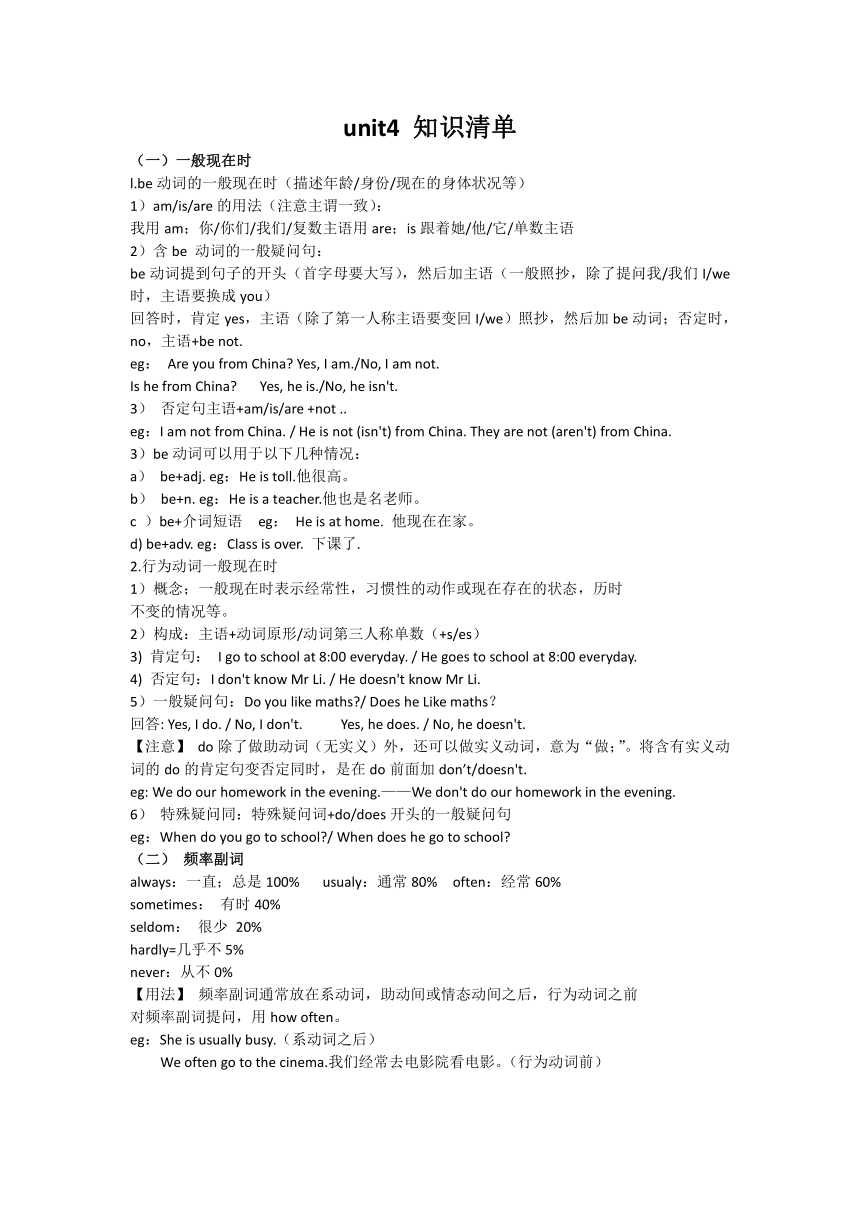
unit4 知识清单 (一)一般现在时 l.be动词的一般现在时(描述年龄/身份/现在的身体状况等) 1)am/is/are的用法(注意主谓一致): 我用am;你/你们/我们/复数主语用are;is跟着她/他/它/单数主语 含be 动词的一般疑问句: be动词提到句子的开头(首字母要大写),然后加主语(一般照抄,除了提问我/我们I/we时,主语要换成you) 回答时,肯定yes,主语(除了第一人称主语要变回I/we)照抄,然后加be动词;否定时,no,主语+be not. eg: Are you from China Yes, I am./No, I am not. Is he from China Yes, he is./No, he isn't. 3) 否定句主语+am/is/are +not .. eg:I am not from China. / He is not (isn't) from China. They are not (aren't) from China. be动词可以用于以下几种情况: a) be+adj. eg:He is toll.他很高。 b) be+n. eg:He is a teacher.他也是名老师。 c )be+介词短语 eg: He is at home. 他现在在家。 d) be+adv. eg:Class is over. 下课了. 2.行为动词一般现在时 1)概念;一般现在时表示经常性,习惯性的动作或现在存在的状态,历时 不变的情况等。 2)构成:主语+动词原形/动词第三人称单数(+s/es) 3) 肯定句: I go to school at 8:00 everyday. / He goes to school at 8:00 everyday. 4) 否定句:I don't know Mr Li. / He doesn't know Mr Li. 5)一般疑问句:Do you like maths / Does he Like maths? 回答: Yes, I do. / No, I don't. Yes, he does. / No, he doesn't. 【注意】 do除了做助动词(无实义)外,还可以做实义动词,意为“做;”。将含有实义动词的do的肯定句变否定同时,是在do前面加don’t/doesn't. eg: We do our homework in the evening.———We don't do our homework in the evening. 6) 特殊疑问同:特殊疑问词+do/does开头的一般疑问句 eg:When do you go to school / When does he go to school (二) 频率副词 always:一直;总是100% usualy:通常80% often:经常60% sometimes: 有时40% seldom: 很少 20% hardly=几乎不5% never:从不0% 【用法】 频率副词通常放在系动词,助动间或情态动间之后,行为动词之前 对频率副词提问,用how often。 eg:She is usually busy.(系动词之后) We often go to the cinema.我们经常去电影院看电影。(行为动词前) 词性变化 1.un(否定前綴)+usual(adj平常的)=unusual (adj.不平常的) 2.I- me-my-mine- myself my(lpron.我的)+self(自己)=myself(pron.我自己) 3.chef(n. 厨师)→ (pl.chefs) 4.ball(n. 球)+oon(另词后缀)=balloon(n.气球) 5.dish(n.菜肴)→ (pl.dishes) 6.shock(v.使震惊)+ed(形容词后缀)=shocked (adj.震惊的) 7. knife (n. 小刀) → (pl .knives) &.usual(adj.通常的)+ly(副词后缀)=usually (adv.通常地) 9.solt(n.盐) +y(形容词后缀)=salty (adj. 咸的) 10.polute(v.污染)tion(名词后缀)=pollution(n.污染) 11.decide(v.决定)去de+sion(名词后缀)=decision(n. 决定) I2.create(V. 创作)去e+ive(形容词后缀)=creative(adj. 有创造力的) 13.medicine(n.医学) 去ine+al(形容词后缀)=medical(adj.医学的,医疗的) 重点短语 ...as well as和;也 ...around the world全世界 3.Spring Festival春节 4.family reunion象庭团聚 5.want to do sth.想要做某事 6.on the phone 通过电话 7.the last dish 最后一道菜 8. be against the law 违法 9.stand for 代表;象证 10.a piece of一块;一片 11.the smell of.. …的味道 I2.feel like感觉像 13.by oneself 独自 14.be sure to do sth. 一定会做某事 15.environmental probbems ... ...
~~ 您好,已阅读到文档的结尾了 ~~